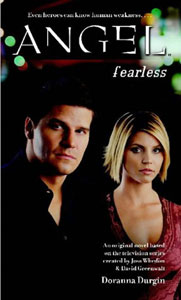Doranna Durgin crafts a more readable and entertaining “Angel” book her second time around with “Fearless” (October 2003). It has the same structure as “Impressions,” which I didn’t like as much, wherein we know what’s happening early on and there aren’t any twists and turns before getting to the end. But because of better character writing for the Angel Investigations team and better guest characters, “Fearless” is the superior entry.
It opens with the gang fighting a monster in the sewers, eventually revealed to be a Giflatl, which hails from another dimension. When this creature injures humans, they heal quickly from a “venom” he creature secretes into the wounds, but also have temporary amnesia and act in a manner akin to being drunk for a couple days. When it injures a vampire, the venom does the opposite, as Angel finds out during days of agonizing recovery from his wounds.
“Fearless,” set in the portion of Season 3 when Connor is a baby, is therefore a little bit like the fan-favorite episode “Spin the Bottle” (4.6) in that everyone is acting goofy, and a little bit like “I Will Remember You” (1.8) in that Angel loses his quick-healing ability. There’s no upside for Angel this time, since he doesn’t become human and he’s now racked with fear when he goes into battle. It’s kind of amusing to see the gang try to figure out what happened to them on the night of the monster attack by using scribbled notes. Then they use notecards to remind themselves of their plan for their second faceoff with the Giflatl, much later in the book.
The most memorable guest character is Kluubp, who needs Angel’s help in sending the Giflatl back to his dimension, because he looks like kind of like Yoda. Kluubp claims “Star Wars” based Yoda’s design on him and also stole his phrase “Do or do not. There is no try.” Durgin peppers a handful of “Star Wars” one-liners throughout the book as Angel and the others wryly react to Kluubp’s appearance. This gag is quite on the nose, and it would be cause for copyright infringement in a visual medium, but the author is having fun with it and I wasn’t bothered by it even if it’s not exactly clever.
Thematically, “Fearless” is about trust among the friends, with Angel on one side; Cordy, Gunn, Wes and Fred on the other; and Lorne – in his role as Connor’s babysitter – caught in the middle. Angel doesn’t want to bring his team into this case because he thinks they won’t want to banish the Giflatl, since it is the source of the healing substance. For their part, the gang knows Angel is acting shifty, and besides, they are indeed thinking about what a healing salve could do for them and for the world at large.
It’s not a bad central conflict, but it’s hampered by Durgin being too wordy about it, going over the same issues many times. And the plotting is, well, plodding. The gang has their first showdown with the Giflatl, everyone talks about the scenarios for a couple hundred pages, and then they face the creature again. There is a subplot on top of this about a symbiotic demon that steals people’s abilities, but that muddies up the plot more so than advancing it. The way this symbiotic demon relates to the Giflatl is summed up thusly by Wes: “I suspect its unusual activity was tied into the Giflatl.”

Weirdly, the people who lose their abilities – including a talented young singer whose voice disappears – don’t get their abilities back by the end of “Fearless,” and the case limps to a conclusion with Cordy musing: “I still wish those people had gotten their skills back.” Not every “Angel” story needs a tidy, convenient ending, but it strikes me as odd that these victims are brushed aside, unimportant to the main thrust of the novel.
Durgin delivers decent character writing. As with “Impressions,” I feel like Gunn’s mistrust of Angel is overplayed, but everyone else is on point, and I like how the author peppers in flirting between Gunn and Fred, lining up with what’s going on at this point in Season 3. Overall, though, “Fearless’ ” solid concept is diminished by a story that’s too predictable, padded and uneven.
Click here for an index of all of John’s “Buffy” and “Angel” reviews.

